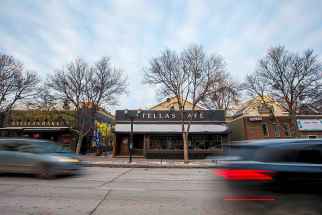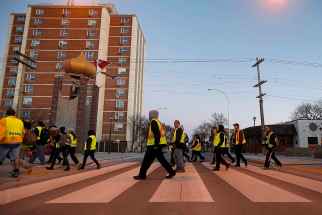Government should ensure Bear Clan funding
Read this article for free:
or
Already have an account? Log in here »
To continue reading, please subscribe:
Monthly Digital Subscription
$0 for the first 4 weeks*
- Enjoy unlimited reading on winnipegfreepress.com
- Read the E-Edition, our digital replica newspaper
- Access News Break, our award-winning app
- Play interactive puzzles
*No charge for 4 weeks then price increases to the regular rate of $19.00 plus GST every four weeks. Offer available to new and qualified returning subscribers only. Cancel any time.
Monthly Digital Subscription
$4.75/week*
- Enjoy unlimited reading on winnipegfreepress.com
- Read the E-Edition, our digital replica newspaper
- Access News Break, our award-winning app
- Play interactive puzzles
*Billed as $19 plus GST every four weeks. Cancel any time.
To continue reading, please subscribe:
Add Free Press access to your Brandon Sun subscription for only an additional
$1 for the first 4 weeks*
*Your next subscription payment will increase by $1.00 and you will be charged $16.99 plus GST for four weeks. After four weeks, your payment will increase to $23.99 plus GST every four weeks.
Read unlimited articles for free today:
or
Already have an account? Log in here »
Hey there, time traveller!
This article was published 16/11/2018 (2579 days ago), so information in it may no longer be current.
It was a simple, yet poignant observation.
The scene was a forum organized last spring by Mediation Services Winnipeg at the Canadian Museum for Human Rights, where I was among people gathered to discuss the often strained relationship between police and Indigenous Peoples. Mediation Services is a non-governmental agency that provides conflict-resolution training and solutions to a wide range of public and private-sector organizations.
Many interesting people were at this event. Winnipeg Police Chief Danny Smyth was there, along with several of his senior officers. The rest of the crowd was made up of Mediation Services volunteers and a wide array of lawyers and community activists. They had come to hear the keynote speaker, North End activist and organizer Michael Champagne.

There was a wide-ranging discussion about how bridges could be built between police and the Indigenous Peoples of the city, particularly in the North End. At one point, Champagne remarked that while it was important for the people of the North End to have a good relationship with police, what they really wanted was to solve problems for themselves, not have people from outside the North End coming in and delivering their version of a solution.
In a recent interview, Champagne repeated his original observation: “The only way we move forward is if North End people are supported to do important work for the North End.”
It’s such a simple, beautiful idea. Lamentably, it’s not always the first consideration when the broader community tries to solve a problem in one area. It seems that far too often, we try to import help and, in so doing, portray everyone who lives in an area of need as dependant and unable to help themselves.
That is, of course, a perverse view of a community, or neighbourhood within that community, in crisis. Even when there are many people in need of help, there are also many people who want to be part of the solution. People like the members of the Bear Clan Patrol.
The original Bear Clan Patrol started in the early 1990s as a purely grassroots, volunteer effort to fend off the creeping influence of Aboriginal street gangs, which were growing in both number and intensity. After some solid, high-profile work, the group fell into disarray and was not heard from again until 2014, when activist James Favel found a dozen or so activists and revived the group in the wake of the murder of Indigenous youth Tina Fontaine.
The early focus of Bear Clan 2.0 was street prostitution. Volunteer patrol members would try to scare off johns cruising North End streets looking for young women. However, the mission expanded quickly: tracking down missing children or runaways, helping drug addicts and discouraging dealers, and general safety and security on the streets of the north and west ends of the city.
What started with a dozen volunteers quickly grew into an organization with a handful of paid staff and, currently, more than 1,400 volunteers. The success in Winnipeg led to the opening of chapters in another 24 communities across five provinces, all of which are supported administratively by the Bear Clan Patrol office here in Winnipeg.
Champagne noted that in a world where government is constantly spouting rhetoric about finding “value” for taxpayers’ money, programs like Bear Clan are “no-brainers.”
“We always talk about building bridges, but the Bear Clan is really acting as a bridge to the rest of the community,” he said. “And it’s also a bridge to other communities as well. Now that there are Bear Clan Patrols in 20-plus communities, we’re showing that a made-in-Winnipeg solution can help people in other places. It’s really one of the more positive stories to come out of the North End, proof that good things happen here.”
The inability of all levels of government to establish sustainable support for a group of North Enders who have proven their value is, in a word, maddening.
With a resumé like that, you might be surprised to know that the Bear Clan Patrol’s future is in doubt.
This month, Bear Clan announced that $100,000 in federal funding had been put into limbo while the federal Liberal government reassesses the enormous demand on the Urban Programming for Indigenous Peoples program. Bear Clan had received $200,000 from this funding stream before and was led to believe more support would be forthcoming. Then, a review of the program put everything in doubt.
Bear Clan does not rely solely on federal money. It takes donations of money and equipment from local charities and businesses. However, core funding for administrative support is desperately needed to keep the group operating and doing good work at street level.
When word of that possible funding shortfall got out, the province stepped up with $200,000 in support in the form of a passenger van, other equipment and financial resources to help the group meet its commitments. However, the provincial support is one-time only and, as much as it is appreciated, does not create certainty going forward.
The inability of all levels of government to establish sustainable support for a group of North Enders who have proven their value is, in a word, maddening. However, it does serve as the perfect example of how government sometimes undermines the work of high-value community groups — people from the community in need, serving the community in need — with inconsistent funding commitments and intergovernmental wrangling.
Although there may be too many worthy groups and causes to properly fund them all, it still doesn’t absolve the federal government from establishing a criteria to identify those groups most worthy of support.
Governments at all levels should work together on a single window for funding of community organizations like Bear Clan, so that they are not constantly scrambling to find long-term financial support.
Groups that truly deserve long-term funding should be immediately put into a separate stream. Support should be provided to help these groups with financial management and reporting, one of the biggest challenges for any organization that evolves from completely volunteer to partially paid.
Other community groups outside that long-term funding stream should be allowed to apply for support in a process that determines whether there is a legitimate need, and whether other organizations are either fully or partly meeting that particular need. Strategic partnerships could be forged between existing groups and upstarts to ensure that as many people as possible are involved without risking redundancies.
What government should not do, in any circumstances, is simply freeze all funding and applications because they don’t know what else to do.
The province should be applauded for stepping in to help the Bear Clan Patrol. But if the people of the North End are going to continue helping themselves, then government is going to have to get its act together.
dan.lett@freepress.mb.ca

Born and raised in and around Toronto, Dan Lett came to Winnipeg in 1986, less than a year out of journalism school with a lifelong dream to be a newspaper reporter.
Our newsroom depends on a growing audience of readers to power our journalism. If you are not a paid reader, please consider becoming a subscriber.
Our newsroom depends on its audience of readers to power our journalism. Thank you for your support.











